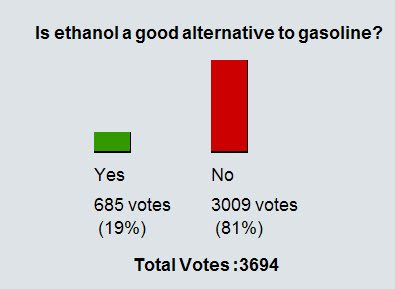81% of Public Are Ethanol Atheists, Thank God
 Results above are from the Wall Street Journal's online poll, accompanying Wednesday's article "Ethanol Craze Cools As Doubts Multiply."
Results above are from the Wall Street Journal's online poll, accompanying Wednesday's article "Ethanol Craze Cools As Doubts Multiply." As Jerry Taylor of the Cato Institute said, "The closest thing we have to a state religion in America today isn't Christianity. It's corn. It's hard to think of a more wrongheaded and ruinous policy than the program to subsidize ethanol. It's time for the voters to rethink their membership in this political cult."
Apparently, 81% of WSJ readers are corn atheists, and have resigned from their membership in the Church of Corn Ethanol, if in fact they ever actually did worship at the altar of ethanol the way politicians, corn farmers and lobbyists do.
(HT: Clover Aguayo)

7 Comments:
I'd be very interested in seeing the results of a scientific poll that represented every day Americans, and not WSJ readers who have been reading plenty of anti-corn/ethanol/subsidies stories and editorials.
It would make the (terrible) answers that came from Romney and Giuliani in the debates the other night even more interesting...were they speaking to a majority voting bloc of Republicans in Iowa and America who support subsidies? Or does the majority know the truth, and were their answers flops?
Mark,
What does the reference HT:)at the bottom of the post mean?
Alex,
What did Romney and Giuliani say?
"Hat Tip: A hat tip is an acknowledgement to someone (or a website) for bringing something to a blogger’s attention.
Hat tip is also, sometimes, abbreviated as h/t or HT."
From Blogossary.com
Anon 7:30 - watch here
Question: Nothing says delicious like cheap corn subsidized by the American taxpayer. For a lot of Americans, however, a bitter taste is left in their mouth when they learned about how the U.S. taxpayer bankrolls billions of dollars in farm subsidies that mostly go to large item business interests. I'm curious which candidate could label themselves fiscally responsiblee, will endorse the elimination of farm subsidies if they are elected president in 2008.
Romney: We don't want to find ourselves, with regards to our food supply, in the same kind of position we're in with regards to our energy supply. And so it's important for us to make sure that our farmers are able to stay on the farm and raise the crops that we need to have a secure source of food. And so I believe in supports that will allow us to do that.
And the same time, I recognize that we're also investing in new technologies to get ourselves energy independent. And I happen to believe that some of the best sources for having renewable energy come from the farm. And so we're investing with subsidies in those areas to create new technology that otherwise wouldn't be ready for the market yet. So I support these programs.
And finally, I'd say this. We have, in our nation, about one out of three acres that are planted are for sale overseas.
We send products around the world. We're competing with European and Brazilian and other farmers, and we're competing in a marketplace where they are heavily subsidized, at great disadvantage for our farmers. And so, if we're going to change our support structure, we want to make sure that they change their support structure.
And we do this together, as opposed to unilaterally saying: We're going to put our farmers in a tough position and have the farmers in the rest of the world continue to be subsidized.
So, open markets, let our goods go around the world and secure our source of food.
Giuliani: The governor's right. It isn't a level playing field. The subsidies in Europe are far higher than they are in the United States. We could reduce subsidies here if they would do it there. But we shouldn't do it on our own.
And also, we have to be very aware of the fact that we have to have our own supply of food. We can't be dependent on foreign countries for our food.
So, both of those reasons would say that although simplistically, it might seem like you'd want to get rid of all the subsidies, you've got to do this very carefully, and you have to do it in concert with these free-trade agreements and other agreements you're making so that European countries reduce their much heavier subsidies.
Alex, you have apparently never read the Reader Responses to WSJ editorials. There are generally more leftist responses than conservative, and the WSJ blogs are polluted by idiot liberals who could use logic to bust out of a rice-paper sack. The WSJ has an undeserved reputation for being hard core right wing. It isn't, nor has it been for a long, long time.
skh.pcola
"couldn't use logic..."
You're right I never have read the reader responses or the blogs...I didn't even know you could comment on news stories or editorials on there. Weird...thanks for the heads up, though I usually tend to avoid the comments on newspaper articles after seeing some of the total lunacy posted the good old Washington Post's website.
Post a Comment
<< Home